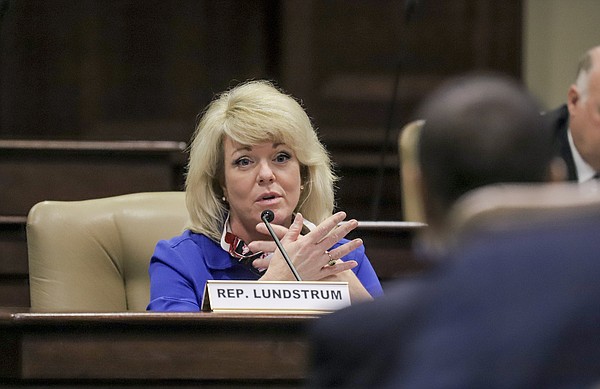
Arkansas’ law limiting transgender-affirming treatments for minors was crafted in the Natural State, not imported from elsewhere, its sponsors say.
Unlike the legislation addressing transgender athletes, which largely mirrors a 2020 Idaho statute, Act 626, the Save Adolescents From Experimentation Act, is the first of its kind to become law.
The sponsor of Act 626, which originated as House Bill 1570, said there wasn’t an existing template.
“Mine was more of a blank slate,” said Rep. Robin Lundstrum, R-Springdale. “Usually, you can look at what other states are doing; things take a while to brew. But this is something that’s coming along very fast.”
The new law bans the use of puberty-blocking drugs on minors and also prohibits surgical interventions, including breast reductions.
Lundstrum said she follows health-related issues closely; she holds a doctorate in health sciences from the University of Arkansas, Fayetteville.
When she learned that puberty-blocking drugs and cross-sex hormones were being given to minors, she became concerned, she said.
Around August, she began looking into possible legislative fixes.
She was driven, she said, by “pure science and pure health.”
She consulted with doctors, psychiatrists and fellow legislators as well as the Bureau of Legislative Research, prior to introducing the legislation, she said.
“I can’t take credit for it. If you’re a medical expert or somebody that’s been in the [medical] field and you stood still long enough, I probably asked you a question,” she said.
While the ultimate legislative wording may be unique, the concept is one that is being debated in state legislatures across much of the country.
Arkansas is one of at least 20 states that have looked at limiting medical options for transgender young people since 2020, according to Cathryn Oakley, state legislative director and senior director of the Human Rights Campaign.
South Dakota was the first, with legislation introduced in 2020, Oakley said. It did not pass.
While the wording may vary somewhat, “we are absolutely seeing similarities with the legislation,” Oakley said. “It is extremely similar from state to state.”
In many states, there are competing pieces of legislation focusing on the treatment of transgender children, Oakley said.
That was true in Arkansas.
Sen. Alan Clark, R-Lonsdale, said he had initially come up with a bill of his own before joining forces with Lundstrum.
“They were not different in theory, but hers was much more comprehensive,” Clark said.
“She had done her homework and really had a good bill,” he said.
Oakley said Arkansas is at the forefront when it comes to anti-LGBT legislation.
In previous years, gay marriage was a popular wedge issue, she said. But it no longer moves voters, she said.
“They lost in the courts. But I think, more importantly, they lost in the hearts and minds of the American electorate,” she said. “The electorate’s in a different place now than it was 25 years ago. Those arguments just don’t work. They sound ludicrous now.”
Conservative social warriors “have to find something new to make people afraid of, and they’ve settled on trans kids,” she said.
Lundstrum and Clark both say their goal is to safeguard young people.
“What people do as adults is really their business, but we should protect children,” Lundstrum said.
Minors shouldn’t be able to make these types of life-altering decisions, Clark said.
“I want them to be able to grow up and be able to make that decision as an adult. Teenagers change their mind every day,” he said.








